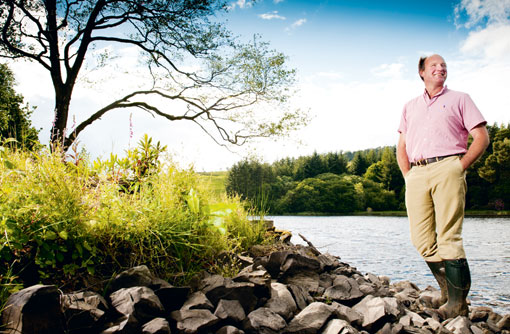FW Awards 2011: Green Energy Farmer of the Year finalist – Neil Gourlay

Neil Gourlay
Auchencheyne, Moniaive, Dumfries
Neil Gourlay encapsulates the spirit of being a “green energy farmer”, proving that sustainability is about more than just installing the latest bit of renewable technology.
Energy and environmental sustainability are at the heart of his strategy to ensure a viable long-term future for the 4,800-acre beef and sheep farm his family has built up over the past 30 years. “The rapid increase in fuel prices will cripple many hill farms like ours, but we hope that by reducing our dependency of fossil fuels we are ensuring a long-term sustainable future for our business,” he says.
Over the past decade he has sought to cut the carbon footprint of the farm business in a variety of ways, all of which neatly embrace his “four Rs” philosophy of “reduce, re-use, recycle, and recover”.
Two micro-hydropower systems have been installed in the past three years to generate electricity for the farm and to export to the grid. The 12kW system fed by a hill tributary at the home farm cost around £70,000 to install, but should pay for itself within 18 months, he reckons. The other 11kW system makes use of an old seven-acre Victorian lake that used to supply water for a country-house hydro electric scheme at the turn of the last century, and should have an equally attractive payback. Neil, together with the farm’s five full-time staff, has tried to do much of the work himself, making full use of the farm’s resources, equipment and materials.
It’s the simplicity of many of these schemes that he thinks will appeal to farmers and he is keen to show what he is doing to others – a number of groups have already visited the farm, along with visitors to the B&B run by Neil’s wife, Mary.
The “thirsty” oil boiler in the main farmhouse has been partially converted to run on electricity from the hydro scheme, which has cut the annual oil bill from £5,000 to £2,000. A Polaris electric buggy has also been purchased and all of the farm’s ATVs have been converted to run on LPG. The three main tractors are all Valtra EcoPower machines, with “chipped” engines to improve fuel economy.
In a move to further reduce his carbon footprint, Neil is fulfilling a lifetime ambition by building his own “carbon-negative” farmhouse. Some £700,000 is being invested in the eco-house, which he intends to rent out as a demonstration of sustainable living once building is complete next spring. It will feature ground-source heating, solar thermal water heating, a biomass boiler and rainwater harvesting. Planning has been obtained for a small wind turbine to provide power for the house, but he hopes to upgrade this to a larger 330kW turbine, which could produce enough to supply 90% of the local village’s needs.
After eight years of planning and public enquiries, Neil has finally been granted permission for a twenty three-turbine wind farm. Six of the 3MW turbines will be on his land at Monybuie. While he acknowledges the concerns some people have, he firmly believes the struggle will be worthwhile, for the business and the local community. “Statistically we’re in one of the windiest places in the country, so it has to be a good thing to do. The green revolution is going to keep people in rural communities and the great thing about wind or hydro is that it can be used on marginal hill land like this and not interfere with food production.”
Farm facts
• 4,800 acres, mainly grass
• 3,200 ewes + 500 suckler cows
• Two hydro power schemes
• New eco-farmhouse
• Wind farm permission granted
The judges liked:
• Sustainable approach to energy, business and life – re-use/ recycle
• Combination of large and small projects
• Good technical knowledge and ability
• Integrated renewables into strong commercial farm
• Keen to involve the community
